- Home
- Jeannie Wycherley
The Wonkiest Witch Page 2
The Wonkiest Witch Read online
Page 2
“It is true that your mother had very little of her own, but in fact she was the beneficiary of your late father’s will. Do you remember much about him?”
“Of course,” I replied, a little irritably. Why wouldn’t I? My father had been a benevolent wizard, fun and energetic. He loved to experiment with all manner of silly spells, and had made me howl with laughter at his escapades. I recalled fondly the yule lunch where he had caused the Brussel sprouts to explode when they arrived at the table. Yasmin had been far from amused but my father and I had chortled all afternoon. Memories such as this, reminded me of how much I missed him. He had disappeared when I was 12. My mother had been vague about what had happened, telling me only that he had died while on some kind of mission for his brotherhood. I had never found out much more about it.
“But I wasn’t aware Dad had much that could be handed down either.” I recalled the small stone cottage we had inhabited for some time, even after his death. “My mother sold our home when I was 18.”
“Erik Daemonne was a wealthy man. He left his entire estate to your mother, on the understanding that she would pass it on to you when you were old enough. She elected never to draw on the income, and I have accounts for the past 18 years if you should wish to inspect the income over that period of time.”
“Income? On what?”
“Your father left you an inn—”
“An inn? As in a pub?” I asked, unable to mask my amazement.
“Yes, with twelve guest rooms and owner’s accommodation.”
“Well, I’ll be ...”
“Quite.”
I blinked in shock. Of all the types of property I might have been left, surely an inn was right up my street. I’d been involved in the hospitality industry my entire adult life. Beer and ale, good food and music, those were the things I understood. How clever of my father to have left this for me. It was almost as if he’d foreseen what I would try and do with my life. But why hadn’t I known about it? Why hadn’t my mother said anything?
“The inn closed down three years ago, but until then it had been run by a manager. Obviously the staff had to be paid, and the inn had become run down. It wasn’t profitable. It will need substantial investment.”
My sense of euphoria evaporated. Basically I’d been left a dud, then? An expensive inheritance that I wouldn’t be able to do anything with. Perhaps I should burn it down along with my mother’s hen coop. Disappointment flooded through me. “I see.”
“But the income from the cottages should help you fix it up, or I suppose you could sell the inn and live off the rental income.”
“Cottages? Rental income?”
“Ah. I’m not really making myself clear, am I?” Penelope Quigwell smiled, or it may have been a grimace, I wasn’t quite sure. “Your father owned a village—er …” Penelope consulted the papers in front of her. “Whittlecombe in East Devon. The properties include a dozen tied cottages, a post office, a convenience store, a café and Whittle Inn itself. Oh and some adjoining land. Some pasture, a wood, that kind of thing.”
“A wood?” What would I do with a wood?
Penelope consulted her papers again. “Yes, Speckled Wood it says here. Around ten acres.” She scanned the paper. “Yes. There are perhaps two dozen or so other privately owned dwellings in and around the area that you won’t derive any income from I’m afraid to say, but certainly, you shouldn’t have any problems living within your means if you’re sensible.”
I felt my eyebrows disappear into my hairline. A dozen cottages? A post office? An inn? A wood? And a village? A whole village? What on earth was I going to do with a whole village?
I hailed a taxi outside Honiton train station and loaded my bags into the back. I’d handed in my notice at the nightclub, kissed my lease on the tiny room in Lewisham goodbye, and bid a not-so-sorry farewell to London and everything the city had come to mean to me. This morning I had awoken with a renewed sense of purpose about life, and excitement skittered around my insides like mice in a cage.
That exhilaration had been forcibly muted by the laborious journey; apparently I’d boarded the slowest train known to witchkind. The train, fast to Reading, had then proceeded to stop at every single station possible. I hadn’t been aware there were this many stations in the whole of England, let alone the West Country. Hadn’t they all been closed in the nineteen sixties? Thank the Goddess I hadn’t been travelling all the way down to Cornwall. Devon, it appeared, was quite far enough away from civilization as it was.
But now I’d arrived. And Devon was as beautiful as I remembered from my time holidaying by the coast as a child. I’d been vaguely aware that my father hailed from these parts, but given that we had settled further up country, towards London, in Somerset, I had never really considered my links to this incredibly beautiful county.
East Devon was a rolling patchwork quilt of green fields and forest. The land undulated up and down, down and up, coloured in a thousand—no, a hundred thousand—shades of green, before sloping inevitably and inexorably down to the sea.
And the roads? No romans had carved these. They were primordial paths that ancient man had picked out. Lanes meandered here and there, turning back on themselves and heading off at right angles. The signposts, those that I could spot as there didn’t appear to be many in existence, seemed meaningless, pointing vaguely between two potential avenues of travel. Fortunately, the taxi driver seemed to know exactly where we were heading.
We arrived into Whittlecombe shortly after three thirty, and the driver pulled up outside a smart looking inn with soft red tiles on the roof, and hanging baskets on the veranda. I stared out in confusion. A freshly painted hanging sign proclaimed I’d arrived at The Hay Barn. I wound my window down to get a better look.
Across the road several locals were gathered outside the Post Office and convenience store, chatting away to each other. Down the road I could see a sandwich board placed on the grass verge outside a café. A row of thatched cottages slipped into the distance, each one painted a different pastel shade and prettier than the last.
“I don’t think this is the right place.” I leant forward to speak to the taxi driver.
“Oh beg your pardon, love,” he replied cheerfully enough. “I thought you were after the inn at Whittlecombe?”
“The Whittle Inn,” I said, and looked out again at the cheerful premises to my right, a sinking sensation in the pit of my stomach.
“Ah right you are then,” he nodded his understanding and started the engine once more. We drove slowly away from The Hay Barn and I saw from the corner of my eye how those gathered outside the Post Office watched us curiously as we moved away.
We cruised past the cottages, looking dreamy in the afternoon sun. Close up I could see they needed fresh paint on the external walls, perhaps some attention to the doors and windows. The thatched roofs appeared to be in good repair which was a relief. I shuddered to think how much it would set me back to re-roof twelve cottages.
The dwellings petered out and the road became a single lane, curling away from the village and heading uphill. To one side were fields, and to the right, forest. A swift right turn—down the narrowest lane imaginable—took us through a tunnel of trees, the dappled sunlight making me blink as we moved speedily through shadow and back to sunshine. The road was pot holed, and although tarmacked, wild grass grew up through the middle. It was a road less travelled for sure.
The lane opened out into a clearing and I caught my first sight of Whittle Inn.
I had the door open and was leaping from the taxi almost before it had pulled to a stop. The driver ratcheted the handbrake as I stood beside the door and gazed in awe at the inn.
It must have been beautiful once. Who knew how old it was? Maybe fifteenth or sixteenth century? Perhaps older. Certainly it had been added to over the years. An Elizabethan veneer here, a Georgian building here, a Victorian extension there, and the adaptation of the stable block to create further accommodation at some time in the las
t century.
The first two storeys were black and white, appearing typically Elizabethan. The upper stories looked to me like something out of a Disney fairy tale, with turrets and arched windows. The first two floors of the building appeared to have buckled, listing dangerously to one side, but the upper floors pulled the whole building the other way.
Whittle Inn was wonky … and I loved it at first sight.
Oh, to be sure it needed work. The paint was flaking from the walls, and peeling from the woodwork, and some of the plaster had fallen away, but even so, this was achievable. I couldn’t see the roof from this low on the ground, but Penelope Quigwell had arranged for a surveyor to come and look at the inn in the morning, so I would find out more tomorrow about what needed doing and how much it would cost me.
The rumble of tyres on gravel behind me and a scattering of small stones alerted me to the fact that I had company. Of course. Penelope had arranged for the local estate agent to come out and hand over the keys to the inn and show me around. He pulled his silver Audi up next to us and hopped out of the car.
“Alfhild Daemonne?” he asked.
“Yes,” I replied, trying to quell my exuberance.
“Jason Joplin from Hawke, Joplin and Harrow. I trust you had a pleasant journey and found Whittlecombe without any problems?”
“Thanks to my taxi driving friend here,” I replied, shaking Jason’s hand. “Let me just get my bags…”
“Please,” Jason leaned back against his car as I rummaged in my handbag to find my purse. The taxi driver hauled my bags out of the boot and took them to the front door. I handed over what I owed him along with a hefty tip. I could afford that now. I was an heiress.
Pleased, the taxi-driver doffed an imaginary cap. “I hope you’ll be very happy here,” he said. “Although I suspect you might be better off staying in The Hay Loft for now.”
I understood what he meant. Whittle Inn was dark. It hadn’t been lived in for years. Who knew what horrors awaited me inside.
I didn’t care.
I waved the taxi driver a cheery farewell and turned my attention back to Jason. He smiled greasily, and held out a ring of keys. The ring itself was rusted, and as big as a normal sized bangle. There must have been in excess of twenty keys hanging from the loop.
“Wow,” I said, taken aback.
“Yes,” Jason replied, obviously enjoying my surprise. “And that’s just the inn. I have a box of keys back at the office that belong to the cottages and businesses that you own.”
I shook my head. “Why would I need the keys for those? They belong to other people.”
“They belong to you,” Jason explained patiently. “You’re a landlord now. For sure there are laws against you gaining access to those properties while they are leased, the tenants have rights after all. But, at the end of the day, you never know when you may have to go in, or send someone in, if your tenant doesn’t pay their rents or stipends.”
“Has that ever happened?” I asked. Penelope had told me that Hawke, Joplin and Harrow had been acting as agents to my father’s estate for several decades, collecting rents and overseeing the drawing up of leases etc.
“Not to my knowledge,” Jason replied. “Everyone loves Whittlecombe. No-one would want to run the risk of being evicted from the village.”
That was a relief.
“Shall we go in?” Jason asked, and I nodded in excitement.
Inside, the inn was much as I had expected, shadowy and cold and unlived in. Once again, structurally everything appeared sound, although the décor was decidedly 1980s and not twenty-first century. We entered directly into the main bar, and I stood for a while taking in my new empire.
To my right a door led to a staircase that would take me up to the bedrooms. Dead ahead the wall was beige plasterboard, with a number of posters, yellowing with age, pinned to the wall. To my left was where all the action happened.
The serving bar itself was a beautiful slab of carved oak, darkened with age and countless layers of polish. Overhead were hooks for glasses, but where the optics would once have lived was nothing but beige wall, stained from splashes and spillages. The floor was covered in a heavy duty carpet and as I walked over it dust motes erupted into the air. They swirled merrily around in the muted sunbeams shining through the filthy windows.
Ugh.
Chairs and tables were piled up in one corner, looking like kindling for a bonfire. I poked around them. They seemed sturdy enough, although all of the styles and shapes were different.
To the right of the bar was a door that took me into a corridor, and brought me to two smaller rooms on the left, each with a stable style door, and a sign attached to the lower half. The first room was named ‘The Snug’ and the next room, ‘The Nook’. Both had a fireplace, benches arranged in a u-shape and a large table. Good little meeting rooms that could be made cosy in no time.
Opposite these a staircase would take me up to my private quarters, but at the bottom of the stairs a door led through into a large old-fashioned kitchen with a range and several ovens, and boxes of utensils and pans in dull metal, as well as access to several large store rooms and the outside.
I pulled open a number of kitchen cupboards and found crockery galore. There was masses of it, much of the china appeared to be incredibly old, and again hardly any of it matched.
The more I poked around, the more I was falling in love with the place. The inn and its contents were ill fitting and mismatched, just like their new owner. I was a wonky witch in a wonky inn and I had never felt more at home.
Upstairs I found more of the same. Quaint brass-framed beds with lumpy mattresses that stank of damp. Walls in desperate need of paint. Carpets that needed ripping up and discarding, and bathrooms with the most ancient plumbing imaginable. I had never clapped eyes on a toilet with an overhead cistern - outside of a museum at any rate - in my entire life.
The owner’s quarters were small but cosy. A living room, a small personal kitchen, a bathroom and a larger bedroom, and an office that looked out over the woods beyond the back of the inn. Speckled Wood, I surmised. I could happily imagine myself ensconced at the large old desk in this room, staring out at the trees and watching the birds and squirrels live their own lives.
Smiling, I made my way to the window to gaze out over the grounds behind the inn. A garden that would likely catch the sun in the evening. I could place tables and benches out there and create a beer garden with lots of sparkling lights and wind chimes. Perhaps I could install some water features and really turn the garden into a fairy paradise.
“You can see yourself living here, then?” Jason was asking, observing the spring in my step I was sure.
“Oh yes. It’s going to need fixing up, but I can’t wait to get started.”
“Could take some time, I suppose.”
“I have plenty of that,” I responded merrily. “I’ll put my back into it.”
“Great. You’ll have guests here before you know it.”
He glanced up at the ceiling and made some notes on his tablet, probably about the staining up there. I’d need to get up in the loft and check out what was going on in the roof space. I would do that with the surveyor, I decided.
I turned for now to the windows and the view out the back. The windows were old, with lead diamond patterning, and an old fashioned clasp for the lock. I lifted a clasp up and pushed hard against the window. It eventually gave, albeit reluctantly, so that I could fling it wide and lean out.
To the right was the old stable block, more recently converted into another two bedrooms. I would need to inspect those too. It looked pretty rundown. Down below was a concrete yard area, presumably outside the back door. That would need prettifying.
A pile of rubbish had been left in the middle of the patio area, little more than a large bundle of rags by the look of it.
Wasn’t it?
Something amongst the pile of rags glinted, catching the sunlight, and I felt a sudden twang in the pit of my
stomach.
There was something odd about the pile, something that caused my sixth sense to sit up and take notice. “What’s that, down there?” I asked Jason and he came up behind me to peer out. I moved out of his way so that he could get a better look.
“Rubbish maybe?” he said, but I could hear the doubt in his voice.
I shook my head, certain that it wasn’t. “I’m going to have a closer look,” I said and hurried out of my new quarters and back down the stairs. The back door was heavy and bowed, with numerous locks and bolts. I surveyed the heavy bolts while waiting for Jason to catch up with me. He sorted through the keys, looking for the right one, drawing a blank again and again.
“Open it,” I urged.
“It must be here somewhere,” he said, tutting in frustration. When he got to the end of the ring he started again. And then again. It took an age. The third time around, just as I was beginning to lose hope, the very first key fit the lock like a glove. He turned it and I heard the tumblers fall.
Jason drew back the dead bolts top and bottom, as I hopped impatiently beside him. Finally, the door was flung open and he stood back to let me through first. I burst out into the late afternoon sunshine and stalked eight or nine paces to where the pile of rags lay on what passed for a patio.
Timidly, I bent down and yanked on one piece of black cloth. It was caught, wrapped around something heavy. As I tugged harder the bundle unrolled, and a gnarled hand, as pale as the underbelly of a shark, flopped onto the concrete slab beside my foot. On one of the milky-grey fingers, a ruby ring, speckled with gold, glittered up at me in the sunshine.
Startled, I shot backwards, colliding with the estate agent hovering behind me.
“Jason?” I said. “I think I may just have received my first guest.”
I spent the night, albeit a shortened one, at The Hay Barn after all. By the time the paramedics had finished with the body and taken it away, and the police had completed their questioning of Jason and myself, it had become apparent that staying at the inn alone was not such a great idea. Jason kindly drove me back into the village and I checked in just before eleven. I threw myself on the bed in my anonymous room, loneliness and depression washing through me.

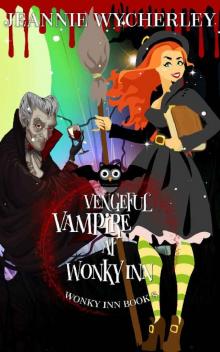 Vengeful Vampire at Wonky Inn: Wonky Inn Book 8
Vengeful Vampire at Wonky Inn: Wonky Inn Book 8 The Wonkiest Witch
The Wonkiest Witch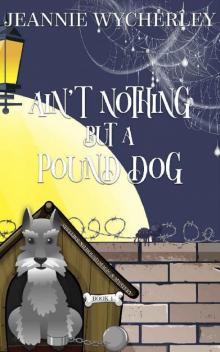 Ain't Nothing but a Pound Dog
Ain't Nothing but a Pound Dog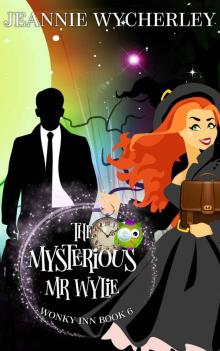 The Mysterious Mr Wylie: Wonky Inn Book 6
The Mysterious Mr Wylie: Wonky Inn Book 6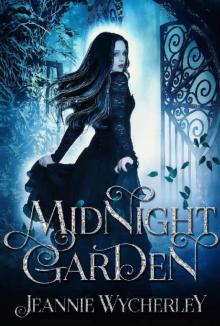 Midnight Garden
Midnight Garden Witching in a Winter Wonkyland: A Wonky Inn Christmas Cozy Mystery
Witching in a Winter Wonkyland: A Wonky Inn Christmas Cozy Mystery The Great Witchy Cake-Off
The Great Witchy Cake-Off The Great Witchy Cake Off: Wonky Inn Book 7
The Great Witchy Cake Off: Wonky Inn Book 7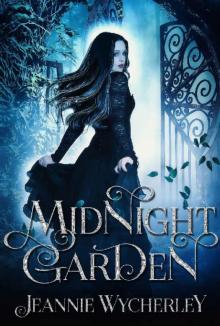 Midnight Garden (The Extra Ordinary World Novella Series Book 1)
Midnight Garden (The Extra Ordinary World Novella Series Book 1)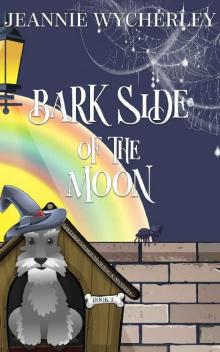 Bark Side of the Moon: A Paranormal Animal Cozy Mystery (Spellbound Hound Magic and Mystery Book 3)
Bark Side of the Moon: A Paranormal Animal Cozy Mystery (Spellbound Hound Magic and Mystery Book 3) A Gaggle of Ghastly Grandmamas: Wonky Inn Book 9
A Gaggle of Ghastly Grandmamas: Wonky Inn Book 9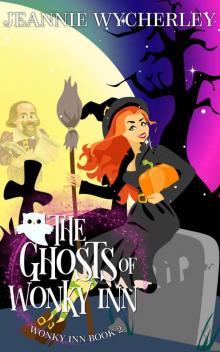 The Ghosts of Wonky Inn: Wonky Inn Book 2
The Ghosts of Wonky Inn: Wonky Inn Book 2 Keepers of the Flame: A love story
Keepers of the Flame: A love story Black Bess
Black Bess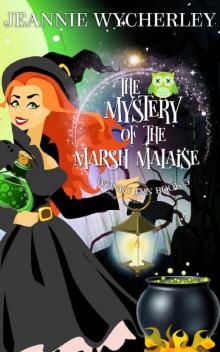 The Mystery of the Marsh Malaise: Wonky Inn Book 5
The Mystery of the Marsh Malaise: Wonky Inn Book 5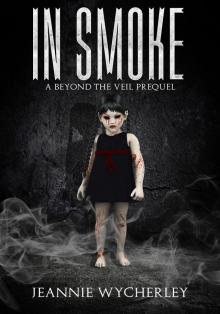 In Smoke eBook ready
In Smoke eBook ready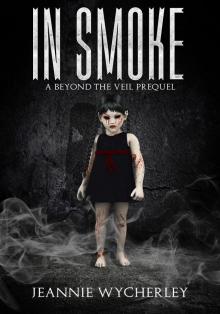 In Smoke
In Smoke